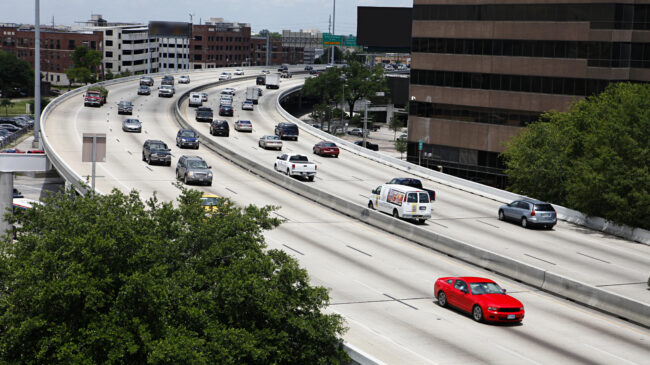Earlier this month, the Biden administration took the unusual step of pausing a Houston highway widening project by using a provision of the 1964 Civil Rights Act.
Politico’s Sam Mintz reported:
President Joe Biden’s Department of Transportation is invoking the Civil Rights Act to pause a highway project near Houston, a rare move that offers an early test of the administration’s willingness to wield federal power to address a long history of government-driven racial inequities.
DOT’s intervention follows complaints from local activists that the state’s proposed widening of Interstate 45 would displace an overwhelmingly Black and Hispanic community, including schools, places of worship and more than 1,000 homes and businesses.
When it was built in the 1950s, I-45 traversed an African-American community. Whether the route was chosen because the land was the cheapest or due to racial motivations, the result was the same: neighborhoods were divided and property values decreased. Unfortunately, it’s not easy to undo past mistakes and holding up this project for historical reasons or political gain won’t solve the problem.
The $7 billion I-45 project aims to rebuild the highway and add four express lanes. The project’s footprint is large. It will result in the displacement of 600 homes, 344 businesses, public and low-income housing, five churches, and two schools. The Texas Department of Transportation (TxDOT) included several benefits aimed at helping the community, including improving the drainage system to prevent flooding, adding bike lanes, and adding pedestrian sidewalks at a number of cross streets.
While the project is needed from a regional mobility perspective, the large number of properties being condemned is troubling. If Texas allowed public-private partnerships (P3s) and tolling, innovation from the private sector may have created a better design. That innovation occurred in Virginia when Fluor found a way to take fewer properties and build the Capital Beltway Express Lanes for 25 percent less than the cost the state of Virginia proposed.
Innovation also occurred in Dallas, where Cintra reconstructed the Lyndon B. Johnson highway by depressing the managed lanes in the middle of the highway, limiting the number of property takings. Such an approach could have been used on I-45, potentially reducing and limiting the number of homes and businesses displaced. But, unfortunately for Texas, in 2017 the state legislature let TxDOT’s authority to use privately financed public-private partnership projects expire.
Today, the I-45 project has already undergone the federally-mandated National Environmental Policy Act (NEPA) review process, which, in addition to environmental concerns, is intended to address social equity, housing displacement, and other Title VI requirements.
Texas is an assignment state, meaning it is one of seven states that can administer parts of NEPA in place of the federal government. Texas worked on the environmental document for 10 years, amassing hundreds of pages on housing, greenhouse gas emissions, and wetlands. The ‘record of decision’ was finalized in February and the project was proceeding.
It’s important to note that the purpose of NEPA is not to stop all negative effects. The purpose is to weigh the positives and the negatives of a project and remediate as many of the negatives as is feasible. But opponents were not satisfied with the review. Harris County sued TxDOT, as the Houston Chronicle’s Dug Begley reported:
Plans to rebuild Interstate 45 in Houston, which state officials say need to move forward as they work through community concerns, took what could be a lengthy detour into federal court Thursday.
In a lawsuit filed in downtown Houston, Harris County Attorney Christian Menefee asked a judge to require the Texas Department of Transportation to halt any further development of the $7 billion rebuild and redo much of the environmental review of the project.
County officials said TxDOT, even when it did recognize the hundreds of families they will displace and thousands more affected by the wider freeway, did nothing to respond to the county’s aim of staying within the current freeway footprint and developing a solution more in line with improving transit and reconnecting local streets.
Activists also pressured the Biden administration to find another way to stop the project. And the administration chose Title VI of the Civil Right Act which states: “No person in the United States shall, on the ground of race, color, or national origin, be excluded from participation in, be denied the benefits of, or be subjected to discrimination under any program or activity receiving Federal financial assistance.”
Transportation departments and planners across the country are now watching this case closely because the rationale for canceling projects threatens to delay, if not outright kill, other transportation projects across the country.
Several weeks after the U.S. Department of Transportation (USDOT) paused the Houston project, Rep. Anthony Brown (D-MD) asked USDOT to also find civil rights violations on the I-270 and I-495 managed lanes project in Maryland. Yet, that project is being built through predominantly white neighborhoods. In fact, that project passes through some of the wealthiest neighborhoods in the Washington D.C. region. Yet Rep. Brown is trying to make an argument for civil rights violations for this project.
This tactic will likely lead to two things in transportation planning, neither of them positive.
First, the added delay will lead to escalating costs. One of the reasons that it costs more to build transportation projects in the United States than just about anywhere else in the world is the length and complexity of the environmental review process. Yet, the Biden administration’s decision tells states that the environmental review process is not enough, they may also need a civil rights review. And activists will surely ask for other reviews like this one.
Second, some projects may simply be canceled. And while some may think that is a good thing, it could actually be a major negative, making it even harder for the cities and states to complete needed infrastructure projects.
Additionally, these types of projects also offer benefits that fly under the radar. For example, air quality could actually improve with this project. The TxDOT I-45 plan would rebuild the general purpose lanes and add managed lanes, which use variable-priced tolls to ensure traffic always flows at speeds of 45-to-55 miles per hour. As a result, speeds on the corridor are expected to increase on all of the lanes. Carbon dioxide emissions are U-shaped, meaning they are highest at extremely low speeds and extremely high speeds. Currently, the speeds on this corridor are often below 20 miles per hour. By raising the speeds and reducing stop-and-go conditions, this project is expected to reduce greenhouse gas emissions in the corridor.
The U.S. has spent the last 20 years trying, but struggling, to speed up the infrastructure project review process. There was widespread consensus that NEPA took too long and was used to delay needed projects. In this case, the Biden administration saw a 10-year NEPA process and decided to add a duplicative civil rights review on top of it.
TxDOT acknowledges some of the problems with this I-45 project but argues, “While minority and low-income individuals and community facilities in the project area would be adversely impacted by the proposed project, no reasonable alternatives would avoid adverse impacts.”
There are many legitimate criticisms of the I-45 project, especially the property takings. But the Biden administration now risks creating a gridlocked approval process that could stop many of the very infrastructure projects it is urging Congress to spend $1.9 trillion on.

